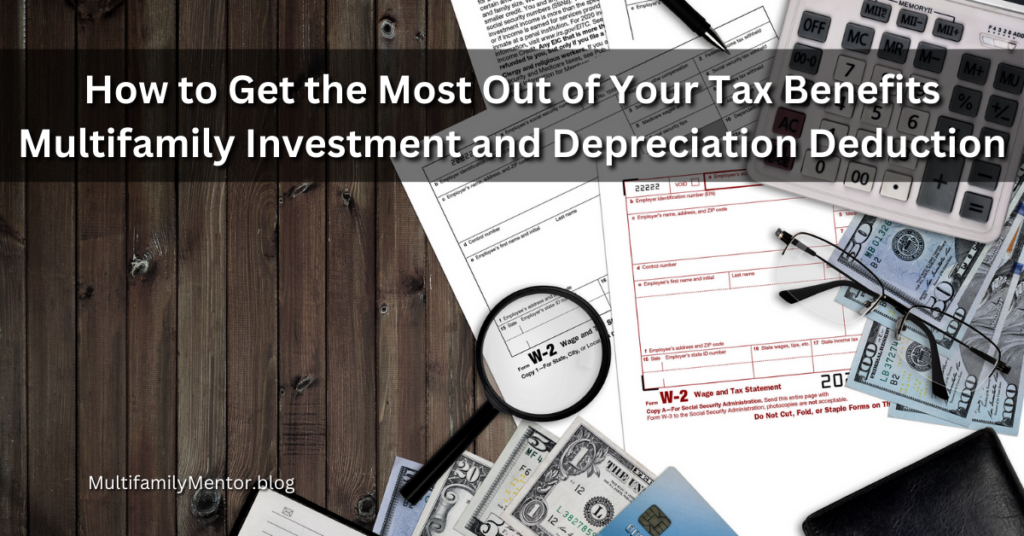Learn how to leverage the depreciation deduction's strength to increase your multifamily investment. With the help of this indispensable manual, learn how to reduce your tax liability and increase your cash flow.
Executive Summary
One of the most significant tax advantages accessible to multifamily investors is the depreciation deduction. Investors can use it to offset their rental income and gradually deduct a portion of the cost of their property, lowering their overall tax obligation. The depreciation deduction, its use, and its significance in multifamily investing will all be covered in this essay. In order to optimize their tax benefits, investors need be aware of the top five subtopics connected to the depreciation deduction.
Introduction
Taxes are a key factor to take into account when investing in real estate. The depreciation deduction is one of the most significant tax advantages accessible to multifamily investors. Although many investors are aware of the deduction, they are unsure of how it operates or how to best take advantage of its advantages. We will give a thorough review of the depreciation deduction and how it pertains to multifamily investing in this article.
What is the Depreciation Deduction?
Investors can deduct a percentage of the cost of their rental property over time via the depreciation deduction, a tax benefit. The basis for this deduction is the notion that rental properties depreciate over time and need upkeep and repairs. Investors must figure out their property's cost basis, which includes the purchase price, closing costs, and other associated costs, in order to be eligible for the deduction. The remainder of this cost basis can then be written down over a 27.5-year window for residential rental properties and a 39-year window for commercial rental assets. The following four details about the depreciation deduction are crucial to remember:
- If an investor sells the property, they will be required to repay the depreciation deductions they have taken through a process known as depreciation recapture.
- The depreciation deduction can only be claimed on the component of the property used for rental purposes.
- Investors can benefit from a bonus depreciation provision, which enables them to deduct up to 100% of the cost of specific property in the year it is placed in service, as well as the fact that the depreciation deduction is a non-cash expense, meaning that investors can deduct the cost of depreciation without actually spending any money.
How Does the Depreciation Deduction Impact Cash Flow?
The cash flow of a property may be significantly impacted by the depreciation deduction. The depreciation deduction can boost cash flow by lowering taxable income, which will save investors money on taxes. Additionally, because the deduction is non-cash, investors can take advantage of it without having to spend any money, which can improve cash flow even more. The following four details regarding how the depreciation deduction affects cash flow should be kept in mind:
- The bonus depreciation provision can offer a significant upfront cash flow benefit.
- The depreciation deduction can also have an impact on a property's net operating income (NOI), which is used to determine the property's value.
- Investors can claim the depreciation deduction without spending any money, which can further increase cash flow.
How Does Cost Segregation Impact Depreciation?
Cost segregation is the process of dividing the assets of a property into groups with various depreciation schedules. Investors are able to accelerate depreciation and take higher deductions in the first few years of property ownership by doing this. The following four details regarding how cost segregation affects depreciation should be kept in mind:
- Accelerating depreciation through cost segregation enables investors to write off more in the first few years of property ownership.
- Although cost segregation can provide investors significant tax advantages, it is not always the right course of action for every property because it can be a complicated process that needs the guidance of a trained specialist.
- Some assets found through cost segregation may also be subject to the bonus depreciation provision.
How Does Depreciation Impact Capital Gains Taxes?
Whenever a landlord sells a rental property, the earnings from the sale may be liable to capital gains taxes. Nonetheless, the investor's claimed depreciation deductions may lower the asset's cost basis and raise the amount of capital gains taxes due. The following four details regarding how depreciation affects capital gains taxes should be kept in mind:
- If an investor sells a rental property, the earnings from the sale may be liable to capital gains taxes.
- Investors can avoid or defer capital gains taxes by using a 1031 exchange to reinvest the proceeds from the sale into another rental property.
- The bonus depreciation provision can also affect capital gains taxes by increasing the cost basis of the property. Depreciation deductions claimed by the investor can lower the property's cost basis and increase the amount of capital gains taxes owed.
How Can Investors Optimize Depreciation Deductions?
There are various actions investors can take to maximize their depreciation deductions and reduce their tax obligations. The following four details on how to maximize depreciation deductions should be kept in mind:
- Investors need to be sure they are correctly estimating the cost basis of their assets and deducting the necessary amounts for depreciation.
- The bonus depreciation provision can give significant upfront tax benefits and should be utilized when appropriate.
- Cost segregation can be a beneficial strategy for accelerating depreciation and claiming higher deductions in the early years of property ownership.
- To be sure they are utilizing all possible tax benefits, investors should consult with a certified tax practitioner.
Conclusion
The depreciation deduction is a potent tax benefit that has the potential to have a big impact on multifamily investors' cash flow and tax obligations. Investors may optimize their tax benefits and enhance the financial performance of their properties by comprehending how the deduction functions and how it relates to other tax techniques like cost segregation and the bonus depreciation provision.

